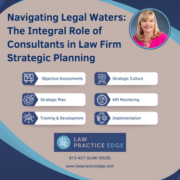Steering Success: The Indispensable Role of a Chief Operating Officer in Modern Law Firms
In the constantly evolving landscape of legal practice, the role of a Chief Operating Officer (COO) in law firms has shifted from an operational sideline to a strategic centerpiece. Law firms, traditionally centered around legal expertise, often overlook the necessity of robust, professional business management. However, as the legal market becomes increasingly competitive and complex, the need for a COO’s business acumen has never been more pronounced.
Below, we delve into the pivotal benefits of having a COO in a law firm and how this role can be a game-changer in navigating the firm’s growth, efficiency, and overall success.
- Strategic Business Planning: Beyond Legal Expertise
Legal prowess alone no longer sets a law firm apart in the crowded marketplace. A COO brings a critical perspective to strategic planning, ensuring that the firm’s business strategy aligns with its legal goals. They guide the firm in making key business decisions, planning long-term growth, identifying areas for investment, and recognizing potential market threats or opportunities, thus ensuring the firm isn’t just legally proficient but also competitively viable.
- Enhancing Operational Efficiency
Efficiency isn’t just a buzzword—it’s a competitive advantage. A COO examines the firm’s overall operations, identifying bottlenecks that might not be evident to legally-trained eyes. They streamline processes, integrate advanced technology, and can lead digital transformation efforts, ensuring the firm is agile and adaptable. This operational tightening directly contributes to client satisfaction, as services become swifter, more reliable, and cost-effective.
- Financial Oversight and Profitability Management
The COO often oversees the firm’s financial health, providing expert management that goes beyond basic accounting. This role involves comprehensive budgeting, financial planning, cash flow management, and profitability analysis. By understanding and monitoring the economic pulse of the firm, the COO supports sustainability and guides strategic decision-making, ensuring resources are effectively allocated for long-term profitability and stability.
- Navigating Change and Innovation
Whether adapting to legal industry shifts or global market changes, law firms must be nimble and innovative. A COO helps law firms navigate through periods of transformation and uncertainty. They can drive innovation, often bringing fresh, external perspectives to traditional practices, and ensuring the firm remains relevant and ahead of the curve. This proactive stance is crucial for embracing change and fostering a culture of continuous improvement and resilience.
- Enhancing Client Relations and Business Development
A law firm thrives on its client relationships. COOs play a vital role in shaping client strategy, improving client retention, and identifying new business opportunities. They ensure that the firm meets its clients’ evolving needs, improving client service models, and using data-driven insights to enhance relationships. Additionally, their outsider perspective plays a crucial role in business development, often seeing untapped markets or potential clients that those deeply entrenched in legal intricacies might miss.
- Fostering Collaboration
A law firm’s success relies on seamless collaboration between its various departments. Even in a small firm, the COO acts as a linchpin, ensuring departmental alignment with the firm’s broader business objectives. They facilitate communication and collaboration among departments, breaking down silos, and creating a more unified, cohesive organizational culture. This holistic approach ensures that every department’s efforts contribute to the firm’s collective success.
- Risk Management
In an era of increased regulatory scrutiny and rapid change, risk management is crucial. COOs bring a business-focused approach to risk, analyzing operational, financial, and strategic risks. Their oversight helps the firm mitigate these challenges, plan for contingencies, and build a solid foundation for the firm’s security and operational integrity.
The role of a Chief Operating Officer in a law firm transcends operational responsibilities, impacting strategic direction, firm culture, client relationships, and long-term sustainability. Law firms looking to thrive in today’s complex, competitive landscape will find the expertise and vision of a COO not just beneficial but essential. By investing in this leadership role, law firms are poised to navigate change effectively, leverage opportunities, and secure a position at the forefront of the legal industry’s future.
Ready for an encouraging update in this narrative? The modern marketplace is witnessing a transformative phase with the advent of fractional executive services, making C-suite expertise accessible to organizations across the board. This development means that operational oversight, once a luxury for large-scale legal enterprises, is now within reach for law firms of every size and capacity.
The implications of this trend are profound and multifaceted. Firstly, it democratizes access to strategic brilliance and experience. Smaller firms can harness the leadership and vision of a COO without the financial strain of a full-time executive position. This access helps level the playing field, offering smaller or mid-sized firms the fighting chance they need to compete effectively in a sector historically dominated by legal juggernauts.
Moreover, the availability of fractional C-suite services alleviates the overwhelming burden often shouldered by internal managers. Typically, these individuals juggle day-to-day operational responsibilities alongside more complex, strategic duties—a balancing act that dilutes focus and hampers innovation. By delegating executive and strategic roles to fractional COOs, internal managers can find respite from the relentless multitasking. This focused approach enables them to channel their energies more productively, ensuring attention to detail where it matters most and fostering an environment where strategic projects and process improvements receive the dedicated efforts they deserve.
In addition to providing relief for overstretched personnel, bringing a fractional COO on board affords an outside perspective that can be invaluable. These seasoned professionals often bring diverse experiences and insights from various sectors beyond the legal realm, contributing to a rich exchange of ideas and strategies. This diversity can be particularly beneficial in steering law firms away from insular thinking and towards a more holistic, innovative approach to their business operations.
In the grand scheme of things, the fractional support model within the C-suite realm is a game-changer. It serves as a catalyst for growth, innovation, and efficiency, regardless of a firm’s size, budget, or stage of development. This availability of expertise at a fractional level not only makes high-level operational oversight more affordable but also stimulates a culture of excellence, strategic insight, and agility that can drive law firms to new heights in today’s competitive legal marketplace.
Suzette Welling, CLM, is the President and Founder of Law Practice Edge, LLC. You can reach her at suzette@lawpracticeedge.com.















